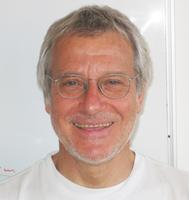Geometric Deep Learning
Petar Veličković – Staff Research Scientist, DeepMind, United Kingdom

The last decade has witnessed an experimental revolution in data science and machine learning, epitomised by deep learning methods. Indeed, many high-dimensional learning tasks previously thought to be beyond reach –such as computer vision, playing Go, or protein folding – are in fact feasible with appropriate computational scale. Remarkably, the essence of deep learning is built from two simple algorithmic principles: first, the notion of representation or feature learning, whereby adapted, often hierarchical, features capture the appropriate notion of regularity for each task, and second, learning by local gradient-descent type methods, typically implemented as backpropagation.
While learning generic functions in high dimensions is a cursed estimation problem, most tasks of interest are not generic, and come with essential pre-defined regularities arising from the underlying low-dimensionality and structure of the physical world. This talk is concerned with exposing these regularities through unified geometric principles that can be applied throughout a wide spectrum of applications.
Such a ‘geometric unification’ endeavour in the spirit of Felix Klein's Erlangen Program serves a dual purpose: on one hand, it provides a common mathematical framework to study the most successful neural network architectures, such as CNNs, RNNs, GNNs, and Transformers. On the other hand, it gives a constructive procedure to incorporate prior physical knowledge into neural architectures and provide principled way to build future architectures yet to be invented.
Biography: Dr. Veličković is a Staff Research Scientist at DeepMind, Affiliated Lecturer at the University of Cambridge, and an Associate of Clare Hall, Cambridge. He holds a PhD in Computer Science from the University of Cambridge (Trinity College), obtained under the supervision of Pietro Liò. His research concerns geometric deep learning—devising neural network architectures that respect the invariances and symmetries in data. For his contributions, he is recognised as an ELLIS Scholar in the Geometric Deep Learning Program. Particularly, he focuses on graph representation learning and its applications in algorithmic reasoning (featured in VentureBeat). He is the first author of Graph Attention Networks—a popular convolutional layer for graphs—and Deep Graph Infomax—a popular self-supervised learning pipeline for graphs (featured in ZDNet). His research has been used in substantially improving travel-time predictions in Google Maps (featured in the CNBC, Endgadget, VentureBeat, CNET, the Verge and ZDNet), and guiding intuition of mathematicians towards new top-tier theorems and conjectures (featured in Nature, Science, Quanta Magazine, New Scientist, The Independent, Sky News, The Sunday Times, la Repubblica and The Conversation). See https://petar-v.com.




Location
Montréal Québec
Canada